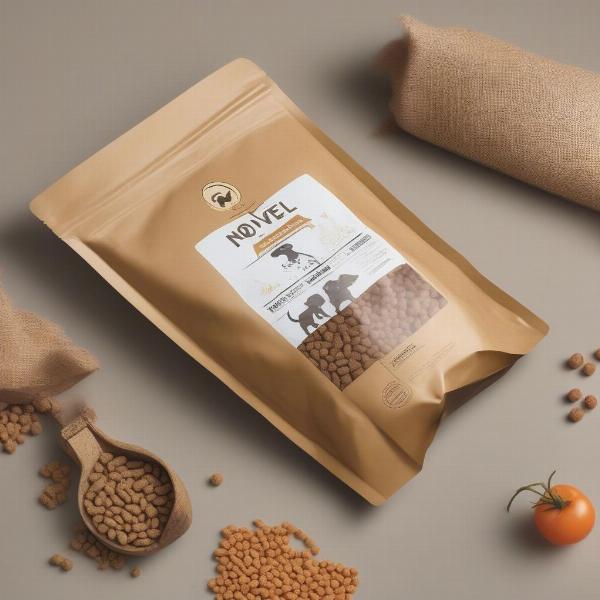Hypoallergenic and grain-free dog food has become increasingly popular amongst dog owners. Many believe these specialized diets can alleviate allergies and improve overall canine health. But with so many options available, how do you choose the right one for your furry friend? This guide dives deep into the world of hypoallergenic and grain-free dog food, providing you with the information you need to make informed decisions about your dog’s nutrition.
Understanding Hypoallergenic Dog Food
What exactly does “hypoallergenic” mean? Hypoallergenic dog foods are formulated to minimize the risk of triggering allergic reactions. Common allergens in dog food include beef, chicken, dairy, wheat, corn, and soy. Hypoallergenic diets often utilize novel protein sources like venison, duck, or rabbit, and replace grains with alternative carbohydrates like sweet potato or peas.
Identifying Food Allergies in Dogs
Recognizing the signs of a food allergy in your dog is crucial. Symptoms can range from itchy skin and ear infections to digestive upset and vomiting. If you suspect your dog has a food allergy, consult with your veterinarian. They can perform tests to identify the specific allergen and recommend the appropriate dietary changes.
The Grain-Free Debate
Grain-free dog food replaces grains like wheat, corn, and rice with alternative carbohydrate sources. While originally popularized for managing allergies, the grain-free trend has expanded to address other perceived health benefits, such as improved digestion and coat health. However, there is ongoing debate about the long-term effects of grain-free diets, particularly regarding potential links to heart conditions. It’s crucial to discuss the benefits and risks with your vet before switching to a grain-free diet.
Choosing a Grain-Free Diet for Your Dog
If you and your vet decide a grain-free diet is suitable for your dog, carefully consider the ingredients. Look for high-quality protein sources and avoid artificial colors, flavors, and preservatives.
Combining Hypoallergenic and Grain-Free: Is it Right for Your Dog?
For some dogs, a diet that is both hypoallergenic and grain-free can be the ideal solution. These diets eliminate both common protein allergens and grains, offering a comprehensive approach to managing sensitivities.  Hypoallergenic and Grain-Free Dog Food However, it’s important to remember that not all dogs require this specialized approach. Always consult with your veterinarian to determine the best dietary strategy for your dog’s individual needs.
Hypoallergenic and Grain-Free Dog Food However, it’s important to remember that not all dogs require this specialized approach. Always consult with your veterinarian to determine the best dietary strategy for your dog’s individual needs.
Is Hypoallergenic Dog Food Necessary?
Sometimes, hypoallergenic dog food might not be the answer. Perhaps your dog simply has a sensitive stomach. In this case, switching to easily digestible companion dog food could be a more appropriate solution.
Best Practices for Switching Dog Food
When introducing any new food, especially a hypoallergenic or grain-free option, it’s crucial to do so gradually. Start by mixing a small amount of the new food with your dog’s current food, slowly increasing the proportion of new food over several days. This helps prevent digestive upset and allows your dog to adjust to the new diet.
Royal Canin Hypoallergenic Dog Food Options
If you’re looking for a reputable brand offering hypoallergenic options, consider exploring the royal canin can dog food range. They provide specialized formulas designed to address various dietary needs and sensitivities.
Conclusion
Choosing the right food for your dog, especially one with specific dietary needs, can feel overwhelming. By understanding the nuances of hypoallergenic and grain-free dog food, consulting with your veterinarian, and carefully considering your dog’s individual needs, you can make informed choices that contribute to their overall health and well-being. Remember, a healthy diet is the foundation for a happy and vibrant dog.
FAQ
-
What are the most common dog food allergens? Common allergens include beef, chicken, dairy, wheat, corn, and soy.
-
How do I know if my dog needs a hypoallergenic diet? Consult your vet if your dog shows signs of allergies, like itchy skin or digestive issues.
-
Are grain-free diets safe for all dogs? There’s ongoing research regarding the long-term safety of grain-free diets. Consult your vet.
-
How do I switch my dog to a new food? Gradually introduce the new food over several days, mixing it with their current food.
-
Where can I find best dry dog food new zealand? ILM Dog offers a variety of high-quality dog foods, including options from leading brands in New Zealand.
Find the perfect treats for your companion
Check out our range of delicious and nutritious dog with biscuit options. We offer a wide variety to satisfy every dog’s taste and dietary requirements. For larger dogs, consider our advocate for dogs 4 10kg 6 pack.
ILM Dog is your one-stop shop for all your dog’s needs, from premium nutrition and health products to expert advice on breeds, training, and care. We are passionate about helping dogs live their best lives. Whether you’re seeking guidance on choosing the right breed, or you need tips on dog training, we have you covered. Contact us for personalized advice and explore our extensive range of products and services. Email: [email protected], Phone: +44 20-3965-8624. Let ILM Dog be your trusted partner in your dog’s journey.